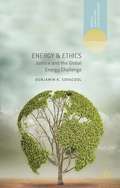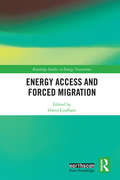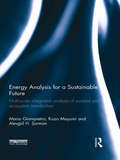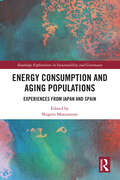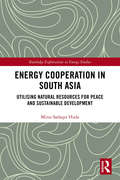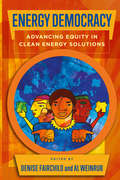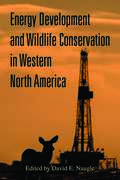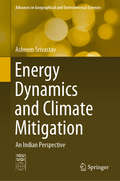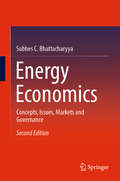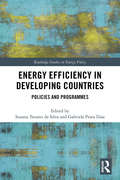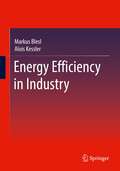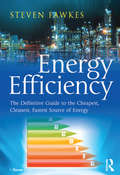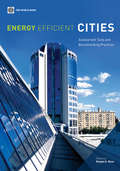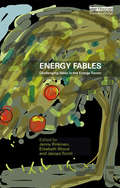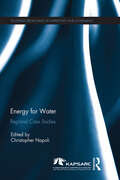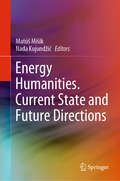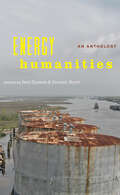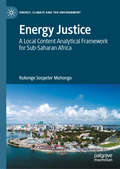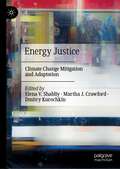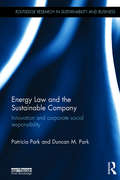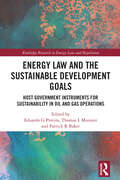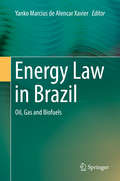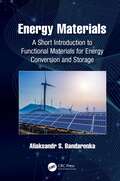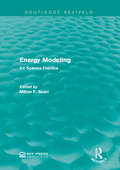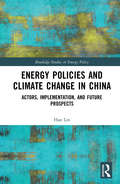- Table View
- List View
Energy & Ethics
by Benjamin K. SovacoolBenjamin K. Sovacool applies concepts from justice and ethics theory to contemporary energy problems, and illustrates particular solutions to those problems with examples and case studies from around the world.
Energy Access and Forced Migration (Routledge Studies in Energy Transitions)
by Owen GrafhamThis edited collection brings together a selection of expert authors and draws on a wide range of case studies, geographies, and perspectives to explore the links between forced migration and energy access. This book addresses the paucity of academic study on how energy is delivered to the millions of people currently forcibly displaced. The contributions throughout assess the current energy governance regimes, models of delivery, and innovative solutions that are dictating how energy is – and can be – provided to those who have been forced to move away from their homes. By bringing together author-teams of practitioners, academics, businesses, and policy makers, this collection encourages interdisciplinary dialogue about the best way of approaching energy provision for the forcibly displaced. This book will be of great interest to students and scholars of energy access and policy, environmental justice and equity, and migration and refugee studies.
Energy Analysis for a Sustainable Future: Multi-Scale Integrated Analysis of Societal and Ecosystem Metabolism
by Mario Giampietro Kozo Mayumi Alevgül H. ŞormanThe vast majority of the countries of the world are now facing an imminent energy crisis, particularly the USA, China, India, Japan and EU countries, but also developing countries having to boost their economic growth precisely when more powerful economies will prevent them from using the limited supply of fossil energy. Despite this crisis, current protocols of energy accounting have been developed for dealing with fossil energy exclusively and are therefore not useful for the analysis of alternative energy sources. The first part of the book illustrates the weakness of existing analyses of energy problems: the science of energy was born and developed neglecting the issue of scale. The authors argue that it is necessary to adopt more complex protocols of accounting and analysis in order to generate robust energy scenarios and effective assessments of the quality of alternative energy sources. The second part of the book introduces the concept of energetic metabolism of modern societies and uses empirical results. The authors present an innovative approach – Multi-Scale Integrated Analysis of Societal and Ecosystem Metabolism (MuSIASEM) – capable of characterizing the quality of alternative energy sources in relation to both environmental constraints and socio-economic requirements. This method allows the metabolic pattern of a society to be described in relation to its feasibility, when looking at biophysical factors, and desirability, when looking at socio-economic factors.Addressing the issue of scale in energy analysis by cutting through the confusion found in current applications of energy analysis, this book should be of interest to researchers, students and policy makers in energy within a variety of disciplines.
Energy Consumption and Aging Populations: Experiences from Japan and Spain (Routledge Explorations in Sustainability and Governance)
by Shigeru MatsumotoThis book explores the impact of population aging on energy use patterns in society from both a theoretical and an empirical angle, with a specific focus on Japan and Spain.Many developed countries are currently experiencing both population aging and population decline, while the demand for social services, such as health care and public transportation, is expected to increase. This book expands upon these well-known socioeconomic challenges and explores the less well-known and more complex relationship between population aging, time allocation to social practices, and energy resource consumption. In the face of energy supply scarcity and climate change concerns, the impact of population aging on energy consumption is of paramount importance. By focusing on the effects of changing time allocation patterns on social practices, the book shows that the impact of population aging on energy consumption will affect not just only affect the residential sector but also other socio-economic sectors of society. Using data from Japan and Spain – currently among the fastest- aging countries in the world – the volume shows that the challenges of an aging society are far more complex and worrying than previously anticipated. If an aging society is an inevitable future, we need to prepare for the challenges that lie ahead.Written by researchers in the fields of demography, economics, environmental engineering, geography, physics, and transportation engineering, this book will compel academics and policy makers to reflect on these problems and act.
Energy Cooperation in South Asia: Utilizing Natural Resources for Peace and Sustainable Development (Routledge Explorations in Energy Studies)
by Mirza Sadaqat HudaThis book analyses the key political challenges to regional energy cooperation in South Asia. It argues that investment in the planning of regional energy projects can increase their viability and also drive integration and peacebuilding. Regional cooperation has been substantiated by academics and multilateral development banks as one of the most viable solutions to South Asia’s crippling energy crisis. However, three decades of national and regional efforts have failed to develop a single multilateral energy project or foster high levels of bilateral cooperation. Using data collected through extensive interviews with policymakers in India, Bangladesh, Pakistan and Nepal, this book identifies the specific roadblocks to energy cooperation – including domestic politics and the failure of leadership on multiple levels - and evaluates how these political challenges determine regional interactions on energy securitisation, environmental cooperation and human rights. Huda then undertakes case studies on four transnational energy projects to highlight specific policy recommendations to overcome these challenges, suggesting planning mechanisms through which the significant issue of energy cooperation in South Asia can be addressed. This book will be of great interest to students and scholars of energy security and geopolitics, natural resource governance and South Asian politics.
Energy Democracy: Advancing Equity in Clean Energy Solutions
by Denise Fairchild Al Weinrub Diego Angarita Horowitz Isaac Baker Lynn Benander Strela Cervas Ben Delman Anthony Giancatarino Vivian Yi Huang Derrick Johnson Cecilia Martinez Michelle Mascarenhas-Swan Anya Schoolman Dr Sean Sweeney Maggie Tishman Miya YoshitaniThe near-unanimous consensus among climate scientists is that the massive burning of gas, oil, and coal is havingcataclysmic impacts on our atmosphere and climate. These climate and environmental impacts are particularly magnifiedand debilitating for low-income communities and communities of color.Energy democracy tenders a response and joins the environmental and climate movement with broader movements for social and economic change in this country and around the world.Energy Democracy brings together racial, cultural, and generational perspectives to show what an alternative, democratized energy future can look like. The book will inspire others to take up the struggle to build the energy democracy movement.
Energy Development and Wildlife Conservation in Western North America
by David E. NaugleEnergy Development and Wildlife Conservation in Western North America offers a road map for securing our energy future while safeguarding our wildlife heritage. Contributors show how science can help craft solutions to conflicts between wildlife and energy development by delineating core areas, identifying landscapes that support viable populations, and forecasting future development scenarios to aid in conservation design. The book calls for a shift away from site-level management that has failed to mitigate cumulative impacts on wildlife populations toward broad-scale planning and implementation of conservation in priority landscapes. It concludes by identifying ways that decision makers can remove roadblocks to conservation, and provides a blueprint for implementing conservation plans.
Energy Dynamics and Climate Mitigation: An Indian Perspective (Advances in Geographical and Environmental Sciences)
by Asheem SrivastavThis book analyzes the current approaches to energy management in India that is based on a carbon-intensive pathway, which if continued, may have serious implications for climate change mitigation with severe consequences for human health and survival. India, being a signatory to the United Nations Framework Convention on Climate Change (UNFCCC), the Kyoto Protocol, and the Paris Agreement, is committed to reducing greenhouse gas emissions; however, the country’s dilemmas are whether to prioritize environment over economy or vice versa and also whether economic growth can be sustained by relying on carbon-intensive development. Those are explored in this book. The Indian economy is poised for a big leap in the near future, and the topmost priority of the government is to ensure energy security, accessibility, and affordability for nearly 1.5 billion people. Currently, 70% of India’s electricity generation comes from coal- and oil-based thermal power plants, and only 12–15% of energy is generated from renewable sources. Experts are of the view that the demand for coal and gas power generation will continue to rise and is expected to reach the equivalent of nearly 2 billion t of oil by 2030. The annual consumption of natural gas is expected to increase fourfold to 200 billion m3 a year in the near future, and its share in the primary energy basket of coal, oil, and gas will rise from 6.5% to 15% by 2030. This will not only cause a significant drain on foreign reserves but will also pose an enormous challenge to policymakers and scientists. This book serves as a useful guide in shaping India’s future energy policy.
Energy Economics: Concepts, Issues, Markets and Governance
by Subhes C. BhattacharyyaThis book provides an updated and expanded overview of basic concepts of energy economics and explains how simple economic tools can be used to analyse contemporary energy issues in the light of recent developments, such as the Paris Agreement, the UN Sustainable Development Goals and new technological developments in the production and use of energy. The new edition is divided into four parts covering concepts, issues, markets, and governance. Although the content has been thoroughly revised and rationalised to reflect the current state of knowledge, it retains the main features of the first edition, namely accessibility, research-informed presentation, and extensive use of charts, tables and worked examples.This easily accessible reference book allows readers to gain the skills required to understand and analyse complex energy issues from an economic perspective. It is a valuable resource for students and researchers in the field of energy economics, as well as interested readers with an interdisciplinary background.
Energy Efficiency in Developing Countries: Policies and Programmes (Routledge Studies in Energy Policy)
by Suzana Tavares Da Silva Gabriela Prata DiasThis book presents a comparative analysis of energy efficiency policies in developing countries. Although there is a vast amount of literature available about renewable energy policy and implementation in the developing world, energy efficiency tends to lack attention. This book fills this lacuna by examining the current state of the field and scope for future improvements. Drawing on a wide range of case studies including Brazil, China and Chile, the authors use a comparative approach to examine the policies and programmes being implemented, looking at the existing legal frameworks and regulatory challenges. By showcasing stories of success, as well as barriers to energy efficiency, they highlight the opportunities for increased energy access and efficiency and demonstrate how these opportunities may directly impact on climate change mitigation. This volume will be a useful resource for scholars and practitioners with an interest in energy policy and efficiency, climate change and international development.
Energy Efficiency in Industry
by Markus Blesl Alois KesslerThis book quantifies the potential for greater energy efficiency in industry on the basis of technology- and sector-related analyses. Starting from the methodological fundamentals, the first part discusses the electricity- and heat-based basic technologies and cross-sectional processes on the basis of numerous application examples. In addition to classic topics such as lighting and heat recovery, the study also covers processes that have received less attention to date, such as drying and painting. The second part is devoted to energy-intensive industries, in particular metal production and processing, the manufacture of the non-metallic materials cement and glass, and the chemical, paper, plastics and food industries. Both parts are concluded by placing them in a larger energy and economic context. The findings are condensed into checklists at many points and summarized in the overall view at the end to form generally applicable recommendations.This book is a translation of the original German 2nd edition Energieeffizienz in der Industrie by Markus Blesl and Alois Kessler, published by Springer-Verlag GmbH Germany, part of Springer Nature in 2017. The translation was done with the help of artificial intelligence (machine translation by the service DeepL.com). A subsequent human revision was done primarily in terms of content, so that the book will read stylistically differently from a conventional translation. Springer Nature works continuously to further the development of tools for the production of books and on the related technologies to support the authors.
Energy Efficiency: The Definitive Guide to the Cheapest, Cleanest, Fastest Source of Energy
by Steven FawkesEnergy risk has reappeared on the corporate and social agenda with a bang and the complexity of the issues has increased many-fold since the days of the last great wave of concern following the oil crises of the 1970s. Steven Fawkes’ Energy Efficiency is a comprehensive guide for managers and policy-makers to the fundamental questions underpinning energy-efficiency and our responses to it: ¢ what do we really mean by energy efficiency? ¢ what is the potential (in different dimensions)? ¢ why it is important? ¢ what management processes lead to optimisation of energy efficiency? ¢ what technologies are useful for improving energy efficiency? ¢ what policies can be used to promote energy efficiency? ¢ how can energy efficiency be financed? ¢ how can energy suppliers engage with energy efficiency? The result is the most comprehensive review to-date of the barriers and opportunities associated with improving energy efficiency. Clearly written and erudite, Steven Fawkes addresses every aspect of energy efficiency, including the huge and vitally important untapped potential offered by effective energy management and the application of existing technology. He also identifies barriers, such as the rebound effect and how they can be mitigated and he provides a comprehensive review of innovative energy efficiency financing options. This book is a ’must read’ for anyone with an interest in energy supply and demand reduction.
Energy Efficient Cities: Assessment Tools and Benchmarking Practices
by Ranjan K. BoseUrban areas account for two-thirds of global energy requirements while housing approximately half of the world's population. With current projections indicating that 70 percent of the world's population will live in cities by 2050, an increase in urban energy use is inevitable. In the face of this growing energy demand, developing climate-friendly urban energy solutions, while protecting the urban development that is crucial to socioeconomic progress in developing countries, is imperative. In an effort to catalyze solutions that would delink high levels of carbon-intensive energy use from urban growth, the Energy Sector Management Assistance Program (ESMAP) of the World Bank launched the Energy Efficient Cities Initiative in October 2008. 'Energy Efficient Cities: Assessment Tools and Benchmarking Practices' is a product of that initiative. The analytical tools and policy insights offered in this volume extend from integrated assessments of new cities to the impacts of socioeconomic, climate, and demographic changes on existing cities. In addition, the documentation and benchmarking of a variety of low-carbon and carbon-neutral good practices provide a range of practical insights on plausible energy efficient interventions in urban sectors. This book will be of particular interest to policy makers, development practitioners, and decision makers in the private sector, as well as researchers within nongovernmental organizations and the academic community.
Energy Fables: Challenging Ideas in the Energy Sector
by Jacopo Torriti Elizabeth Shove Jenny RinkinenEnergy Fables: Challenging Ideas in the Energy Sector takes a fresh look at key terms and concepts around which energy research and policy are organised. Drawing on recent research in energy and transport studies, and combining this with concepts from sociology, economics, social theory and technology studies, the chapters in this collection review and challenge different aspects of received wisdom. Brief but critical introductions to classic notions like those of ‘energy efficiency’, ‘elasticity’, ‘energy services’ and the ‘energy trilemma’, together with discussions and analyses of well-worn phrases about ‘low hanging fruit’ and ‘keeping the lights on’, articulate aspects of the energy debate that are often taken for granted. In re-working these established themes and adding twists to familiar tales, the authors develop a repertoire of new ideas about the fundamentals of energy demand and carbon reduction. This book presents a valuable and thought-provoking resource for students, researchers and policy-makers interested in energy demand, politics and policy.
Energy For Water: Regional Case Studies (Routledge Special Issues on Water Policy and Governance)
by Christopher NapoliWater and energy are inextricably linked as unsound management of either resource can have an impact on the cost, availability, and sustainability of the other. This book explores the "energy for water" component of the water–energy nexus. It offers diverse case studies from around the world including the deserts of Saudi Arabia, rural China, Pakistan’s Indus Basin, arid Greek islands, and urban centers such as Los Angeles. The analyses show that while many regions face unique water scarcity challenges, they are all united by the fact that solutions require mobilizing energy.This book focuses on how different policies and technologies are changing the way societies use energy to extract, treat, and transport water. In terms of policy, chapters explore how initiatives aimed at reducing demand for water and improved integrated resource planning can lead to energy savings. Regarding technology, case studies highlight the pros and cons of different methods of meeting water demand. Through exploring both technology and policy across a wide range of diverse case studies, the book offers a robust explanation of the "energy for water" side of the water–energy nexus equation, making it valuable reading for academics and policymakers.This book was originally published as a special issue as International Journal of Water Resources Development.
Energy Humanities. Current State and Future Directions
by Matúš Mišík Nada KujundžićThis edited book explicitly deals with the energy humanities, summarising existing knowledge in the area and outlining possible future directions for the nascent field. Assuming a variety of disciplinary stances and using a plethora of methodologies to address a number of pressing energy-related issues, the individual contributions showcase the crucial importance of including the humanities and social sciences into the current discussion on energy. Furthermore, they illustrate one of the central claims of the energy humanities, namely, that energy permeates all aspects of our contemporary modes of existence, and is inextricably linked with historical, political, social, ideological, and cultural issues, relationships, and practices.Through numerous case studies, Energy Humanities and Energy Transition looks to the past, present, and future in search of examples of best practices and possible models for pathways to a successful energy transition and life ‘after oilʼ. While much of existing research on energy humanities has been criticised for its excessive focus on oil, this book considers a wide range of energy resources, including nuclear energy, renewables, and natural gas. Furthermore, it brings to the forefront under-researched topics such as the colonial legacy inscribed in energy infrastructure and the energy history of the humanities. The contributions in this volume explore not only how the perspectives and expertise of the humanities and social sciences can alter the discourse on energy transition, and our way of thinking about possible solutions and future scenarios, but also how their new focus on energy affects the disciplines themselves.Energy Humanities and Energy Transition presents a variety of theories, methods, topics, and disciplinary angles, meaning it will be of interest to a wide audience, from practitioners and policy makers, to students and researchers working across the humanities and social sciences. The thematically oriented structure, distinct focus of each individual chapter, and the comprehensive introduction and conclusion that contextualize the contributions within the wider framework of energy transition, make this edited book accessible to readers from many different fields and suitable for various university programs.
Energy Humanities: An Anthology
by Imre Szeman and Dominic BoyerHow can humanities scholars help us respond to growing concerns about climate change and fossil fuels?Energy humanities is a field of scholarship that, like medical and digital humanities before it, aims to overcome traditional boundaries between the disciplines and between academic and applied research. Responding to growing public concern about anthropogenic climate change and the unsustainability of the fuels we use to power our modern society, energy humanists highlight the essential contribution that humanistic insights and methods can make to areas of analysis once thought best left to the natural sciences.In this groundbreaking anthology, Imre Szeman and Dominic Boyer have brought together a carefully curated selection of the best and most influential work in energy humanities. Arguing that today’s energy and environmental dilemmas are fundamentally problems of ethics, habits, imagination, values, institutions, belief, and power—all traditional areas of expertise of the humanities and humanistic social sciences—the essays and other pieces featured here demonstrate the scale and complexity of the issues the world faces. Their authors offer compelling possibilities for finding our way beyond our current energy dependencies toward a sustainable future.Contributors include: Margaret Atwood, Paolo Bacigalupi, Lesley Battler, Ursula Biemann, Dominic Boyer, Italo Calvino, Warren Cariou, Dipesh Chakrabarty, Una Chaudhuri, Claire Colebrook, Stephen Collis, Erik M. Conway, Amy De’Ath, Adam Dickinson, Fritz Ertl, Pope Francis, Amitav Ghosh, Gökçe Günel, Gabrielle Hecht, Cymene Howe, Dale Jamieson, Julia Kasdorf, Oliver Kellhammer, Stephanie LeMenager, Barry Lord, Graeme Macdonald, Joseph Masco, John McGrath, Martin McQuillan, Timothy Mitchell, Timothy Morton, Jean-François Mouhot, Abdul Rahman Munif, Judy Natal, Reza Negarestani, Pablo Neruda, David Nye, Naomi Oreskes, Andrew Pendakis, Karen Pinkus, Ken Saro-Wiwa, Hermann Scheer, Roy Scranton, Allan Stoekl, Imre Szeman, Laura Watts, Michael Watts, Jennifer Wenzel, Sheena Wilson, Patricia Yaeger, and Marina Zurkow
Energy Justice: A Local Content Analytical Framework for Sub-Saharan Africa (Energy, Climate and the Environment)
by Rukonge Sospeter MuhongoThis book explores local content policies and their role in natural resource management within the realm of energy justice. Based on several country case studies it discusses the role of regional integration for such policies in Sub-Saharan Africa. Energy justice has been widely applied across different aspects of development, but here the principles of justice are specifically integrated with the management and implementation of oil and gas projects. Such an analysis offers novel means of implementing policies in local regions, moving away from a one-size fits all approach that leads to the ineffective transplantation of policies from developed economies to developing Sub-Saharan economies. The book argues that with a regional approach, Sub-Saharan Africa can leverage natural resources, industrial parks, supplier clusters, regional financing mechanisms and regional training facilities which would drive down the costs of production, increase efficiency and integrate the local Sub-Saharan population into the oil and gas industry. This would result in the benefits as well as the environmental concerns and responsibilities intrinsic to these industries, being spread more equally amongst local and none local stakeholders. This book will be a valuable resource for scholars and students as well as policy makers and practitioners in the areas of extractive industry-related disciplines energy governance, and economic development in Africa.
Energy Justice: Climate Change Mitigation and Adaptation
by Martha J. Crawford Elena V. Shabliy Dmitry KurochkinThis book offers an insight into climate change mitigation and adaptation strategies and discusses energy justice issues within this framework. The concepts of sustainability and sustainable development have become popular among local communities, international policymakers, and researchers. In addition to these important topics, themes such as climate justice, environmental justice, global energy justice, ecological justice, sustainable justice, and procedural justice remain attractive to scholars and researchers internationally. In this book, scholars elaborate on various responses to human-induced climate change, calling for action, mitigation, and adaptation, and encouraging further thorough analysis and research in the field.
Energy Law and the Sustainable Company: Innovation and corporate social responsibility (Routledge Research in Sustainability and Business)
by Patricia Park Duncan Magnus ParkWhat kind of decision-making should multinationals engage in to create a sustainable company? There is substantial debate over why CEOs, senior management and Boards of Directors make the wrong decisions by not asking the right questions, with the result that not only is the company itself damaged, but all of the stakeholders find themselves at a detriment. Focusing on innovation, technology transfer and the use of intangible assets, Energy Law and the Sustainable Company features case studies from the oil and gas sector, to illustrate how to develop a sustainable business. Considering corporate social responsibility from the perspective of international and national law, the book demonstrates how companies can be both profitable and ethical using the influences of psychology to encourage senior decision makers to make the right decisions. It was revealed that reputation was the main principle influencing decision-making. The book also discusses how companies have reported on their sustainability strategy and considers how technology transfer and intangible assets may play a part in addressing global sustainability. This book should be invaluable reading to students and scholars of Sustainable Business, Business Law, Corporate Social Responsibility, Environmental and Energy Law as well as Environmental and Energy Management.
Energy Law and the Sustainable Development Goals: Host Government Instruments for Sustainability in Oil and Gas Operations (Routledge Research in Energy Law and Regulation)
by Thomas L Muinzer Eduardo G Pereira Patrick R BakerThe UN Sustainable Development Goals are an ambitious agenda for environmental sustainability, economic development, and social transformation. The SDGs include targets for governments, in partnership with private industry and communities, to improve access to affordable and reliable energy, reduce inequality, protect natural resources, and invest in transparent legal institutions and resilient infrastructure. Although transitioning energy systems towards a low-carbon future is a core aspect of the SDGs, the International Energy Agency anticipates that oil and gas will remain a significant component of the global energy mix for some time. Host Government Instruments are tools which governments use to grant oil and gas companies permission to develop state-owned resources. In addition to bringing substantial resources into governments, these HGIs often also include environmental commitments as well as commitments to local hiring, stakeholder engagement, and investment in economic development programmes. The different structures of HGIs and their precise terms and conditions are crucial determinants of the sustainability of oil and gas operations conducted thereunder. This book addresses how governments can use HGIs to advance the SDGs. Part I introduces the SDGs and the legal institutions and governance related to HGIs, including in relation to international energy development, international environmental treaties, the Paris Agreement, and human rights regimes. Part II examines specific provisions within HGIs and regulatory systems which relate to the oil and gas sector and SDGs. It provides case studies to illustrate approaches to HGIs and to identify opportunities for host governments and international oil and gas companies to advance the SDGs. The book concludes with a summary of recommendations regarding how host governments, in partnership with the oil and gas industry, can use HGIs to advance economic development and sustainability goals, and advances potential insights towards development of new and renewable resources.
Energy Law in Brazil
by Yanko Marcius de Alencar XavierThis book describes the energy-law situation in Brazil. It focuses on three specific energy sectors: oil, natural gas and biofuel. The decision to concentrate on these areas takes into account the role that these energy sectors play in the economic, political and legal systems in Brazil, as well as the fact that they are the primary subjects of current discussions surrounding economic regulation in the country. The book, composed of thematic chapters authored by specialized legal researchers, analyzes the different aspects of the oil, gas and biofuels industry, starting with an introduction and technical points and followed by a discussion of the legal issues. It also considers the different legal areas used to examine the aforementioned energy sectors, such as regulatory law, environmental law, tax law, international law, among others. The book will serve as a valuable guide for researchers interested in understanding Brazilian energy law, and at the same it time presents the state of the art of studies carried out in Brazil.
Energy Materials: A Short Introduction to Functional Materials for Energy Conversion and Storage
by Aliaksandr S. BandarenkaEnergy Materials: A Short Introduction to Functional Materials for Energy Conversion and Storage provides readers with an accessible overview of the functional materials currently employed or investigated for energy provision, conversion, and storage. Rather than exploring the physical and chemical basics of energy conversion and storage, this book focuses on the various materials used in this field with simple explanations of their design principles, specific functionality, and quantitative figures of merit. It is suited for advanced undergraduate and graduate students studying energy and energy materials in physics, material science, engineering, and chemistry courses, as well as scientists starting their research in the field of functional materials for energy applications. Key Features: Provides an accessible introduction to complex subjects in simple terms with pedagogical features to enhance learning Contains the latest developments in this exciting and growing area Discusses examples from modern high-impact research and applications
Energy Modeling: Art Science Practice (Routledge Revivals)
by Milton F. SearlIn 1973, a seminar was held by Resources for the Future to bring together the new and growing community of scholars researching into the general field of energy modelling. Originally published in the same year, this report gathers together all of the papers presented at that seminar in order to further spread the results of these studies with those who were unable to attend. The papers cover a full range of techniques used for energy modelling whilst commenting on current government and industry models. This title will be of interest to students of Environmental Studies.
Energy Policies and Climate Change in China: Actors, Implementation, and Future Prospects (Routledge Studies in Energy Policy)
by Han LinIn the face of growing environmental challenges, including climate change and energy security, countries across the globe are developing new policies and programs to address these challenges, and China is no exception. This book analyses China’s two most significant climate-related energy policies, the Clean Development Mechanism (CDM; including the later Chinese Certified Emission Reduciton – CCER) and the Energy Conservation and Emission Reduction Scheme (ECERS). This work specifically examines the strengths and weaknesses of these policies to highlight the deficiencies and advise how they can be optimised, so China can better achieve its emission reduction goals. It analyses the roles and relationships between relevant actors and identifies how successful their cooperation has been, and what factors have affected it. Importantly, the work draws on a wide range of sources from central ministries to civil society, including interviews with Chinese officials, scholars, energy company managers, environment non-govermental organisation (ENGO) personnel, media reports, and online forum discussions. In doing so, the book not only analyses the thoughts of policymakers, as many works do, but also those implementing the policies and those impacted by the policies. The book concludes by offering detailed and practical solutions to address each specific deficiency in the CDM and ECERS policies, with the aim of providing innovations and alternative approaches to improve current and future policies in China. This book will be of great interest to students, scholars, and policymakers interested in climate change, energy, and Chinese environmental policy and politics.
